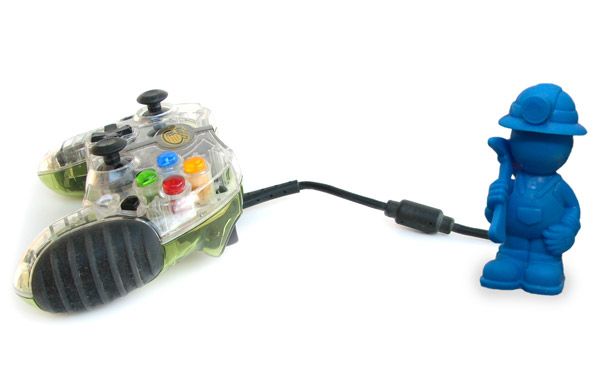Casual Crossover: Learning from the Casual Video Game Industry: Page 2 of 3

Understanding the market
The video game industry has invested heavily in studying its demographic. Several studies from reputable research firms like the Nielsen Industry have found time and again that users want simple mechanics, quick play time, and they like to return and play the same game or kinds of games in frequent but short intervals.
The board game industry should drill down into existing video game studies and invest in studies of their own. It seems highly likely that evidence from existing and new studies will help push the industry to focus in on new and creative board, card, and dice games that meet the needs of the average consumer, are simple to learn, and enjoyable to come back to.
Enhanced user experience and accessibility
The video game industry has leveraged new technologies and simplified controls so that anyone can play. My two year old son is sitting on the floor playing Angry Birds with his fingers on my Nintendo 3DS as I write this. Touchscreens on portable devices, not just game devices, have revolutionized the way we play games. My neighbor loves her Apple iPad; she is in her late seventies and she had never played games before in her life, yet last month she and I had a discussion about the games she was playing avidly! A few years ago, my dad and my son, both video game novices and generations apart, picked up the Nintendo Wii motion controller and played virtual golf together.
So much of what has enabled the casual video game industry to grow stems from the fact that the technology to play these games is already in customers’ hands. A portable device with a touchscreen is now in the hands of 46% of the U.S. population2 — that is a staggeringly huge gift to casual game developers who can sync up with and deliver their games on these devices for little or no charge to the consumer. Games that leverage new technologies like touchscreens, motion controls, and social media to enable simple control schemas for all users have created new inroads for non-traditional video game players.

The board game industry has begun to take advantage of these new technologies by creating virtual board game apps that simulate the experience of playing a physical game, yet the opportunity is often missed to promote the physical counterparts. For instance, I often play Settlers of Catan on Xbox live, and there is no mention of the physical game, nor is there an option to receive more information about purchasing it. If gathering around a table for face-to-face play is the ultimate goal, virtual board game apps need to do a better job of promoting the “real thing.”
To further make use of new technologies, casual board game designers should begin to think more about how mobile devices and physical games can be integrated. With cameras and scanners on nearly every device, it would seem that apps that can interface and enhance the gaming experience would go hand in hand — yet only a few publishers are beginning to experiment with this. All tabletop games should also come standard with QR codes that provide instant access to demos, instructions, more ways to play, and anything that simplifies and enhances the user experience.






Hi!
I agree that boar games (or any industry) can look at something similar as a benchmark and apply it to increase their success. I often hear the board game/video game comparison and I think there are some very valid points.
What I don't often read are some of the critical differences of why these mediums, and what defines them, are difficult to apply to one another.
I think the author listed a few things about video games:
- Quick play time
- Repetitive task
- Easy/intuitive instruction
- Readily accessible technology
- Inexpensive initial purchase cost
Those were some general things that opened up the market to the casual/general audience. And then there were some other comments around the subject (Wii Fitness etc).
I tend to agree that a board game company can look at the computer game market and find out how to mirror that success, but I also saw a ton of logistical/mechanical issues if we try too hard to mimic what the computer game industry has done.
The Differences between the Two:
I think that the reason someone plays a casual video game should be different than the reason they play a casual board game. I think if we try as a market to say: "Play these board games! They are just like your video games!" people would not choose a board game over a video game. And I think that is because a board game cannot compete with a video game in terms of:
1. Quick play time (set up alone on a board game takes a while--not to mention it requires multiple people to play)
2. Repetitive task (this will be hindered because a board game takes a while to play)
3. Expense (a board and components by its very nature will be more costly than an electronic game)
4. Logistical requirements (a board game requires multiple things that a video game does not, mainly, time and other people)
I think we may want to look at, and advertise WHY a board game is DIFFERENT than a casual video game, and why these differences are GOOD.
Let's embrace the fact that a board game wont play like pac man. Let's focus on a different purpose: A board game is meant to bring people together and they will collectively be entertained by the people playing the game, not necessarily (or just) the game itself.
I think this is critical. If we look at a video game-- a person is entertained by the game alone. Multiplayer is an option, but a lot of times, unnecessary and even unwanted in games!
But a board game, the multiplayer component is the very reason TO PLAY. Not the game itself.
I think if we say: Play a casual game because it is different than the games on your phone, because you will have a conversation with your friend you never would have had otherwise. This is our point of difference. This is where we justify that it takes longer to play, that it is not the same as a video game.
If we try and mirror/mimic video games too closely, I think we do what board games are meant to do a disservice. If we make them like video games, they wont be able to compete with a video game, and will always be second best. But if we say, "keep your video games, but play board games because it is a different purpose" then we will have a unique selling point.
I think this is harder to do--saying that a board game is not about YOUR entertainment alone, but it's about other people as well, this runs counter to what we as consumers are used to (everything catering to exactly what we want as an individual--how I feel, regardless of others). But I think we need to celebrate this difference in board gaming. I don't want to see a simple copy of what video games do.
Perhaps I am over-zealous, perhaps I am misguided in this post. But I just thought of that as I was reading this article.
TL;DR
Video games are great in their unique way, board games are great in their unique way. Let's not try to make board games a mere copy of what video games are doing; let's highlight their differences, and why each has a reason to be.
Great comments, thanks Sean! You seem knowledgable and passionate about this topic...we'd love to have you on board as an author at some point. Email us at editor@casualgamerevolution.com if you'd like to be involved with future articles about this or similar topics.